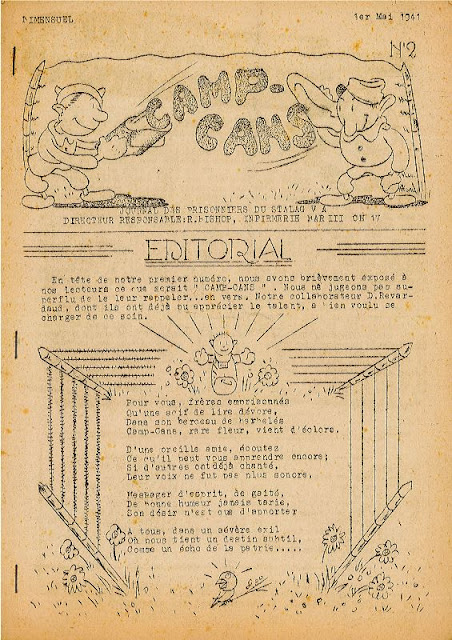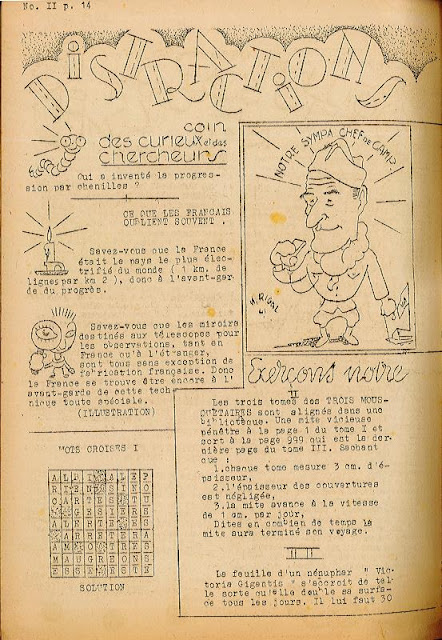La vie à Ludwigsburg n’avait pas grand-chose à voir avec celle du kommando. Le camp était vaste et les distractions sans être nombreuses avaient le mérite d’exister : pièces de théâtre, concerts, expositions d’art et d’artisanat, conférences, les prisonniers avaient reconstitué une société dans cet univers carcéral. Même la nourriture qu’ils se faisaient dans leur chambrée était à la « mode française », les uns les autres s’essayant comme cuisinier et mon père fut même pâtissier de sa chambrée durant une longue période. Comme quoi les situations extrêmes peuvent susciter des aptitudes inconnues chez les individus qui les vivent (je n’ai jamais vu mon père faire de la cuisine ni de la pâtisserie). Il y avait même un journal spécifique au Stalag VA, fait par les prisonniers, mais qui devint aussi un outil de propagande du gouvernement de Vichy qui envoyait des informations afin qu’elles soient reprises par ce journal, et donc largement approuvé par les autorités Allemandes, le célèbre « Camp-cans » qui arrêta sa publication en octobre 1942. C’était un bi-mensuel dans lequel les journalistes relataient une conférence, parlait des problèmes du camp, d’informations utiles, publiaient les poèmes écrits par les prisonniers, et inséraient des articles politiques imposés par le gouvernement de Vichy, et que les responsables de Camp-cans refusèrent d’insérer dans les débuts du journal. D’ailleurs les discussions à propos de ce gouvernement et du Maréchal Pétain étaient nombreuses pour savoir s’il était traitre à la France ou non. Mon père écrivit d’ailleurs quelque chose de troublant dans son journal intime, quand il était en kommando, lui et ses camarades n’avaient d’autres liens avec la France que les lettres qu’ils recevaient, Camp-cans n’arrivait presque jamais dans les kommandos où il était, et les discussions au sujet de Pétain finissaient quasiment toujours sur le même constat, c’était un traitre à la patrie. A Ludwigsburg, ce n’était pas la même chose, les prisonniers avaient accès facilement à Camp-cans et étaient majoritairement persuadés que Pétain était un vrai patriote. « Camp-cans » arrivait-il à ses fins en influençant les prisonniers Français ?
Life in Ludwigsburg had little to do with the kommando's life. The camp was vast and the distractions without being numerous had the merit of existing: plays, concerts, art and craft exhibitions, conferences, prisoners had reconstituted a society in this prison world. Even the food they made in their room was in "French fashion", each other trying to cook and my father was even a pastry chef in his room for a long time. This shows that extreme situations can lead to unknown skills in the people who experience them (I have never seen my father cook or bake). There was even a newspaper specific to the Stalag VA, made by the prisoners, but which also became a propaganda tool of the Vichy government which sent information so that it could be taken up by this newspaper, and therefore widely approved by the German authorities, the famous "Camp-cans" which stopped its publication in October 1942. It was a bi-monthly magazine in which journalists reported on a conference, talked about the camp's problems, useful information, published poems written by prisoners, and inserted political articles imposed by the Vichy government, and which “Camp-cans” officials refused to include in the newspaper's beginnings. Moreover, there were many discussions about this government and Marshal Pétain to find out whether or not he was a traitor to France. My father wrote something disturbing in his diary, when he was in kommando, he and his comrades had no other ties with France than the letters they received, “Camp-cans” almost never arrived in the kommandos where he was, and discussions about Pétain almost always ended on the same observation, he was a traitor to the country. In Ludwigsburg, it was not the same thing, the prisoners had easy access to “Camp-cans” and were mostly convinced that Pétain was a true patriot. Did "Camp-cans" achieve its goals by influencing French prisoners?





Aucun commentaire:
Enregistrer un commentaire
Si vous désirez la version numérique du livre Stalag VA merci de laisser votre adresse mail à: b.dusehu.becker@gmail.com
Als u de digitale versie van het boek Stalag VA wilt ontvangen, kunt u uw emailadres achterlaten op: b.dusehu.becker@gmail.com
If you would like the digital version of the book Stalag VA please leave your email address at: b.dusehu.becker@gmail.com